Do you feel nervous before an exam or an interview? Do you feel choked under pressure before a performance or public presentation? Performance anxiety is a common mental health issue experienced by millions of people worldwide.
What is performance anxiety?
Popularly known as stage fright, it refers to the feeling of nervousness, fear, or apprehension that a person experiences before or during a performance, such as giving a speech, playing an instrument, or taking an exam.
It negatively affects the performers’ mental and emotional states and impairs their ability “to maintain focus and execute learned skills.” It can manifest as physical symptoms such as trembling, sweating, or an elevated heart rate, and can interfere with a person’s ability to perform at their best.
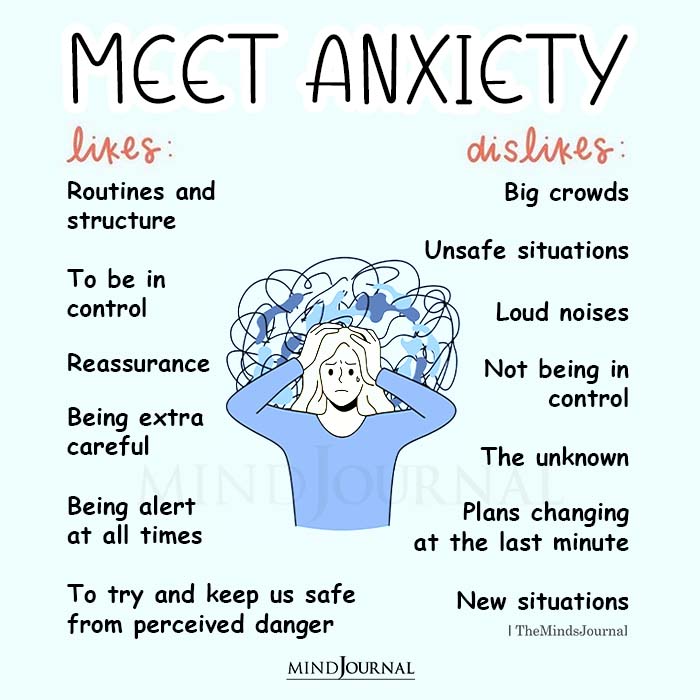
Researchers explain that it can be described as the “anxiety that people experience in anticipation of and/or during important tasks, resulting in impaired performance.”
It is closely associated with stress which adversely affects cognitive performance by increasing our focus and attention to negative thoughts, instead of our actual performance.
Related: What Is Anticipatory Anxiety And How To Stop Worrying About The Future
This form of anxiety is a common phenomenon and can affect people in various settings, including the workplace, school, and social situations. It can be caused by a variety of factors, such as lack of preparation, fear of failure, self-doubt, or a history of negative experiences.
Researchers have also observed that “Women more frequently reported distress and impairment due to performance anxiety than men.”
Moreover, age was not found to be a factor that affected anxiety levels before a performance. Common symptoms typically include “poor concentration, rapid heart rate, tremor, sweating, and dry mouth.”
There are various techniques that can be used to manage stage fright, such as deep breathing exercises, visualization, cognitive restructuring, and exposure therapy.
It’s important to seek professional help if such anxiety is interfering with your ability to perform everyday tasks or is causing significant distress.
Symptoms of performance anxiety
Here are some common symptoms of this type of anxiety –
- Rapid heartbeat
- Sweating
- Trembling or shaking
- Dry mouth
- Difficulty breathing or shortness of breath
- Nausea or stomach discomfort
- Dizziness or lightheadedness
- Headaches
- Muscle tension or stiffness
- Difficulty concentrating
- Negative or self-critical thoughts
- Fear of failure or embarrassment
- Avoidance of the situation or activity causing the anxiety
- Panic attacks
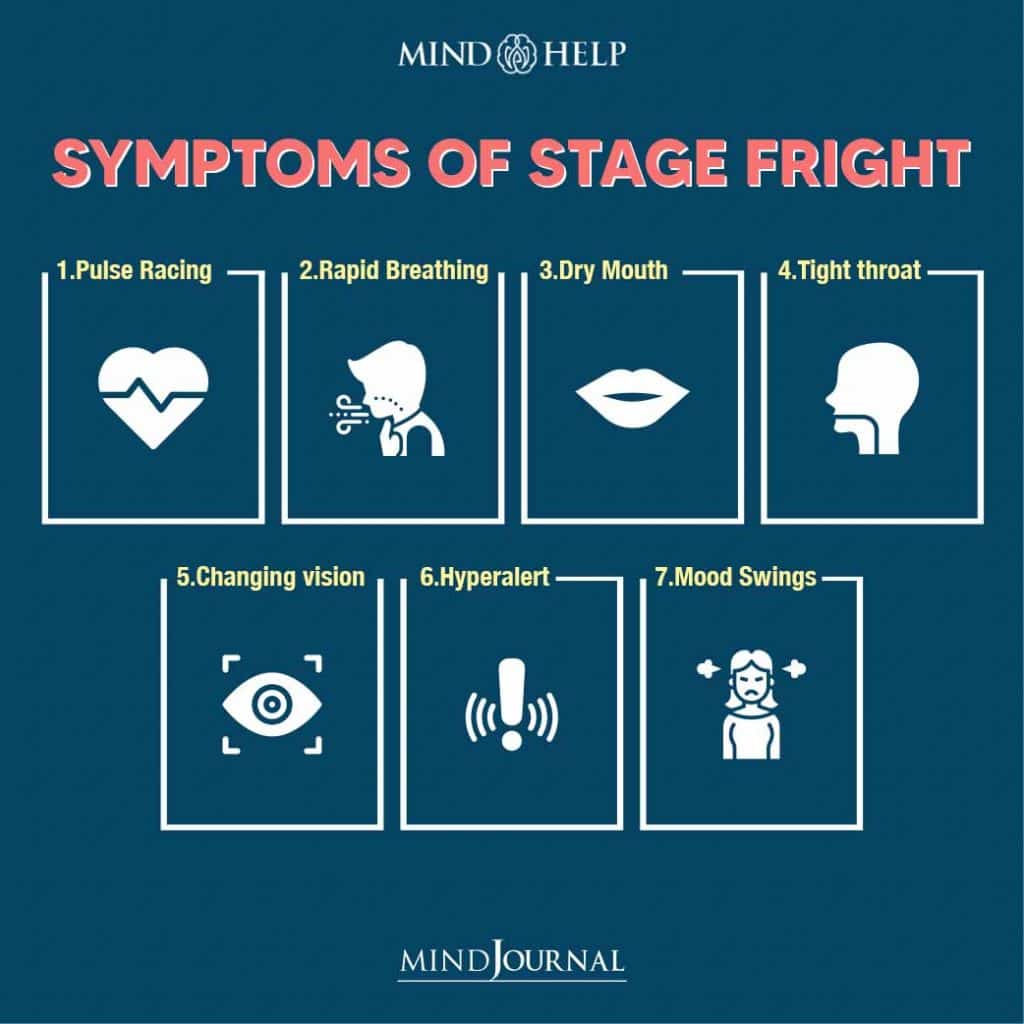
It’s important to note that not everyone experiences the same symptoms and the severity of symptoms can vary from person to person.
What does it feel like?
Performance-related anxiety is the feeling of dread someone experiences before performing in front of an audience. While anyone can experience this form of anxiety at any time, actors, public speakers, musicians and athletes tend to experience it often before an event.
Regardless of how well someone has prepared and practiced for a performance or an exam, most of us tend to feel panicked, apprehensive and afraid before the moment of truth. Our mind fills with fear and self-doubt, while our heart beats faster due to the pressure of performance.
However, this can often prove self-sabotaging as sufferers can become “distinctly handicapped by their anxiety.” As a result, we end up performing poorly, much worse than we know we are capable of, considering our skills and the efforts we put into practice.
But as the anxiety we experience right before the performance is too intense, it can make us lack confidence, and be hesitant & doubtful.
Stage fright can be triggered in any type of situation, whether before a big performance, a tournament, an exam, an interview, a formal presentation, writing a paper or a novel, while trying to park your car or even before having sex. Even when you are not prone to feeling anxious, you may experience it at times.
Related: 10 Anxious Behaviors That Could Actually Be Trauma Responses
“Anxiety has long been associated with diminished performance within a number of domains involving evaluative interpersonal interactions, including Sex, Sport, and Stage,” as these experiences “share the common elements of evaluation and consequence,” explains a 2019 study.
Further research reveals that “An estimated 2% of the U.S. population is afflicted by debilitating performance anxiety.”
In fact, it can be so debilitating and severe that it can end someone’s career, whether professional, academic or athletic, as it can make someone “perform at a level well below their demonstrated capabilities,” during an event.
If you feel choked under pressure due to anxiety before an event, remind yourself that this is a normal feeling and most people experience it. There are several coping strategies that can help you overcome it and live a more confident life.
Types of performance anxiety
While it can be experienced by anyone, anytime and under any circumstances, there are some common types of anxiety related to performance:
1. Stage fright
It is a type of anxiety that is characterized by feelings of anxiety when speaking or performing in front of an audience. It can manifest in physical symptoms such as sweating, shaking, or a racing heart, and can interfere with a person’s ability to perform effectively.
Stage fright is common among performers, but can also affect anyone who is required to speak or perform in front of others, such as in a business meeting or public event.
2. Test anxiety
It is a type of anxiety that is characterized by feelings of fear in anticipation of taking exams, such as standardized tests or important assessments. It can manifest in physical symptoms such as sweating, trembling, or faster heart beat, and can impair one’s ability to do their best.
Test anxiety is common among students, but can also affect anyone who is required to take an important exam or assessment, such as a job interview or certification exam.
3. Athletic performance anxiety
It is a type of anxiety that is characterized by feelings of nervousness in anticipation of a performance associated with sports and physical activities, such as competition or performing in front of coaches or scouts. It can interfere with an athlete’s ability to perform effectively.
It is common among athletes, but can also affect anyone who engages in physical activities and is required to perform in front of others, such as dancers or gymnasts.
Related: How Psychological Safety Impacts Performance And Well-being
4. Social anxiety
It is characterized by feelings of fear, nervousness, or anxiety in social situations, such as public speaking, meeting new people, or attending parties. It can seriously interfere with a person’s ability to engage socially.
Social anxiety is common among individuals, but can also affect anyone who is required to interact with others in social settings, especially when introducing yourself to a formal or social group.
5. Work-related anxiety
It is associated with job-related tasks or responsibilities, such as presentations, meetings, or interviews. This feeling of fear and nervousness can interfere with a person’s ability to perform job-related tasks or responsibilities effectively.
Work-related anxiety is common among individuals in a variety of professions, but can be particularly challenging for those in leadership or high-pressure positions.
It’s important to note that such anxiety can occur in any situation and that there can be overlap between these different types.
What causes performance-related anxiety
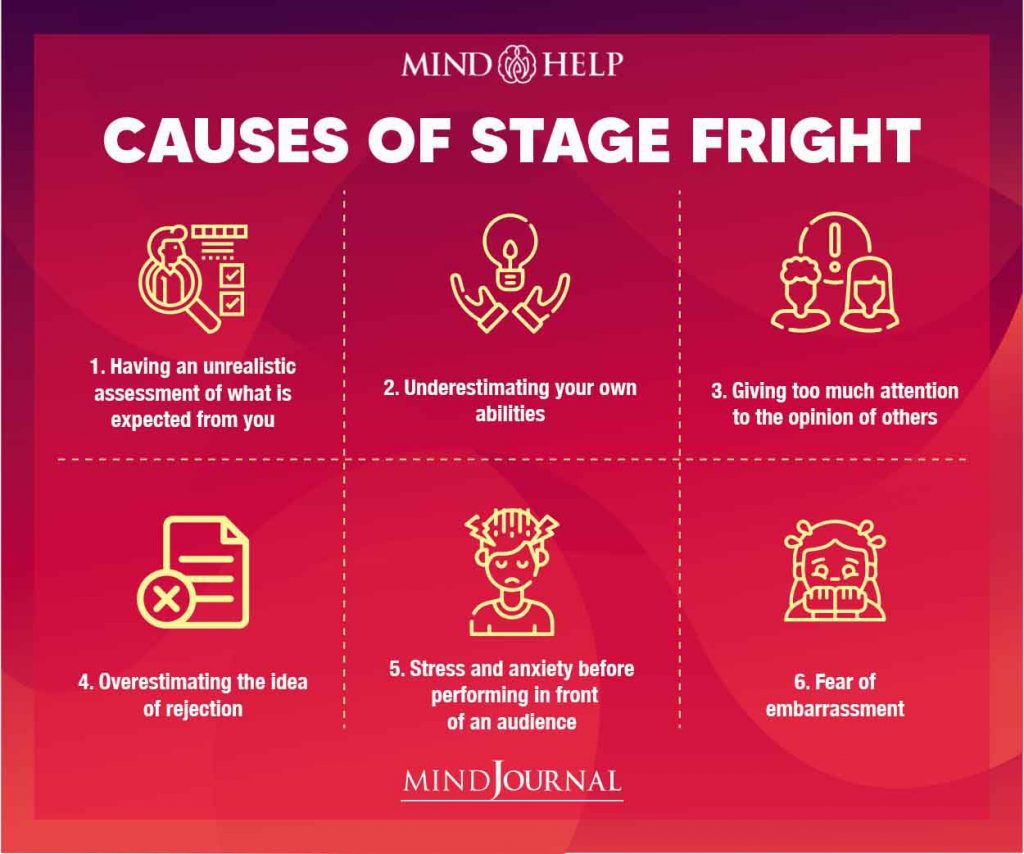
The simple answer is that stress, doubt, expectations, worry and anxiety about performing before others is what triggers performance anxiety. It is often made worse by the fear of being judged and evaluated by others based on our performance and abilities.
It has more to do with our mindset before the performance rather than our actual ability to perform. When not regulated properly, this type of anxiety can impair the performance of even the most well trained and seasoned talents.
Related: Intrusive Thoughts: Where They Come From and Why
Depending on the severity of the condition, some individuals may become triggered simply by anticipating a performance or thinking about a stressful event. So the more you worry about an event, the more you will feel threatened by being judged.
However, there are certain factors that may trigger the onset of anxiety before a performance, such as –
1. Fear of failure: A person may worry about not meeting their own or others’ expectations, which can cause anxiety.
2. Lack of preparation: If a person feels unprepared for a task or situation, it can increase their anxiety.
3. Negative past experiences: If a person has had negative experiences in similar situations in the past, it can create a sense of apprehension or fear.
4. Perceived social pressure: If a person feels that they are being evaluated or judged by others, it can increase their anxiety.
5. Perfectionism: If a person has a tendency to hold themselves to extremely high standards, it can create anxiety when they feel they may fall short.
6. Physical discomfort: If a person is experiencing physical discomfort, such as illness or fatigue, it can increase their anxiety.
It’s important to note that everyone experiences anxiety differently and that triggers can vary from person to person.
How to treat performance anxiety
There are several approaches to treating this form of anxiety, however, the treatment option may vary in effectiveness based on the intensity of the symptoms. It is best to consult a mental health professional like a psychiatrist, a psychologist or a therapist to treat this condition.
Here are some of the most common treatment methods for performance-related anxiety –
1. Cognitive-behavioral therapy (CBT)
CBT is focused on identifying and changing negative thought patterns that contribute to anxiety. A therapist can work with a person to identify triggers and develop coping strategies to manage anxiety.
“Cognitive-behavioral therapy (CBT) is a first-line, empirically supported intervention for anxiety disorders,” explains a 2021 study.
2. Medications
Certain medications, such as beta blockers and benzodiazepines, can be prescribed to help manage symptoms of this type of anxiety. It’s important to note that medication should be prescribed and monitored by a medical professional.
Studies have found that medications for anxiety tend to be safe, tolerable and effective in most cases.
Related: 6 Hacks For Battling Imposter Syndrome
3. Relaxation techniques
Relaxation techniques, such as deep breathing, progressive muscle relaxation, and visualization, can help reduce anxiety symptoms. These techniques can be practiced regularly to help a person feel more relaxed and calm in stressful situations.
4. Exposure Therapy
Gradually exposing oneself to situations that trigger anxiety can help build confidence and reduce anxiety over time. This can involve starting with small, manageable situations and gradually working up to more challenging ones, under the guidance of a trained professional.
Studies have found that exposure therapy has “earned its rank among empirically supported treatments (ESTs) for anxiety disorders.”
5. Support groups
Joining a support group or talking with others who have experienced such anxiety can provide a sense of validation and support, as well as practical tips for managing anxiety.
It’s important to note that not all approaches to treating anxiety work for everyone, and it may take some trial and error to find the right approach. It’s also important to seek professional help if anxiety symptoms are interfering with daily life or causing significant distress.
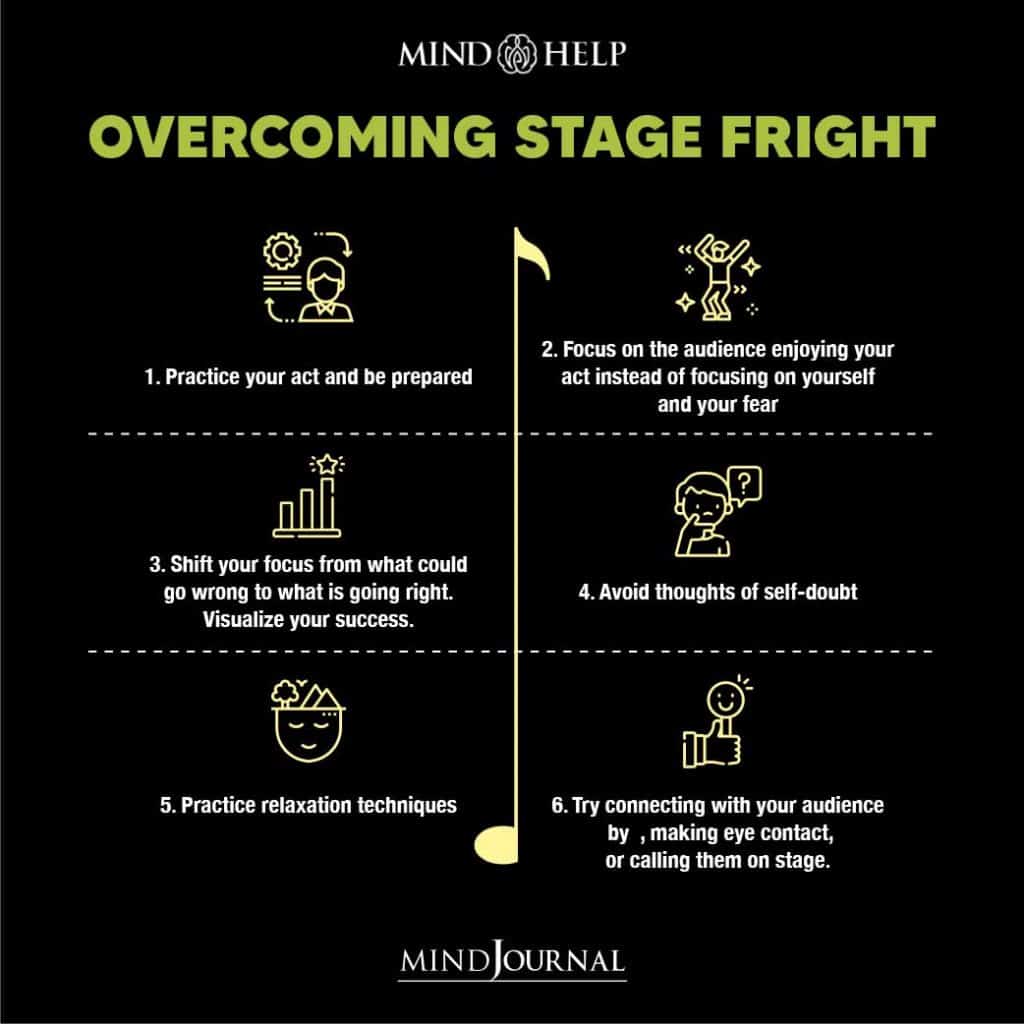
How to prevent performance anxiety
Wondering how to deal with performance anxiety? While it may not be possible to completely prevent such anxiety, there are several strategies that can help reduce the likelihood of experiencing it. Here’s how to break the cycle of performance anxiety –
1. Preparation & practice
Adequate preparation is key to reducing anxiety. The more prepared a person feels for a task or performance, the less anxious they are likely to feel. This can involve practicing and rehearsing, as well as seeking feedback and guidance from others.
Related: 8 Signs Of Toxic Perfectionism And How To Deal
2. Mindfulness
Rather than worrying about what may happen or what has already happened, focus on the present moment and what you need to do in the immediate future. Mindfulness techniques, such as meditation and yoga, can help a person become more present and calm, reducing anxiety symptoms.
3. Visualization
Visualizing success and positive outcomes can help reduce anxiety. This can involve imagining a successful performance or task, and focusing on feelings of confidence and calm.
4. Positive self-talk
Positive self-talk can help reduce negative thoughts and feelings that contribute to anxiety. This can involve affirming oneself and focusing on strengths and past successes.
5. Exercise
Regular exercise can help reduce stress and anxiety, as well as boost mood and confidence. You can choose to do some light exercises like going for a walk or a quick run before a performance to reduce stress and anxiety.
6. Relaxation techniques
Practicing relaxation techniques, such as deep breathing, meditation, and progressive muscle relaxation, can help reduce anxiety and promote feelings of calmness.
7. Time management
Effective time management can help reduce stress and anxiety by ensuring that tasks are completed in a timely and manageable manner.
8. Reframe negative thoughts
Challenge negative thoughts that may be contributing to your anxiety. Instead of thinking, “I’m going to mess up,” try thinking, “I have prepared for this and I am capable of doing well.”
9. Practice self-care
Make sure you are taking care of yourself in the days leading up to your performance. Get enough sleep, eat a healthy diet, exercise, and avoid excessive caffeine or alcohol.
10. Seek professional help
If your performance-related anxiety is severe and interfering with your daily life, consider seeking the help of a mental health professional who can provide additional strategies and support.
It’s important to note that these strategies may not work for everyone, and it’s okay to seek professional help. Additionally, it’s important to remember that some level of anxiety before a performance or task is normal, and can even be beneficial in helping a person stay focused and motivated.
Related: 10 Surprisingly Effective Natural Remedies for Anxiety
Prioritize confidence over fear
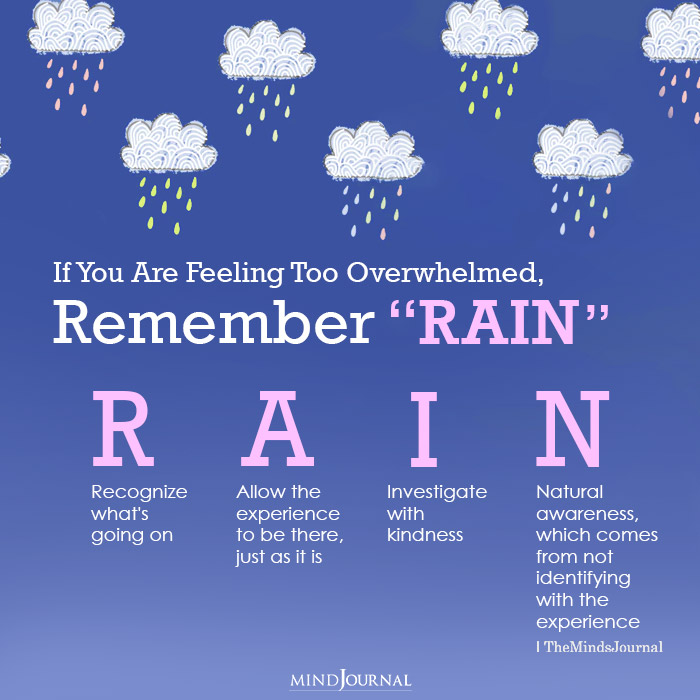
Performance anxiety can be a challenging and overwhelming experience, but it is important to remember that it is a common experience that many people face. By taking steps to prepare thoroughly, reframe negative thoughts and seek professional help, you can effectively manage your anxiety and perform at your best.
Remember that your worth is not determined by your performance, and that mistakes and setbacks are a natural part of the learning process. With practice and persistence, you can overcome performance-related anxiety and achieve your goals.
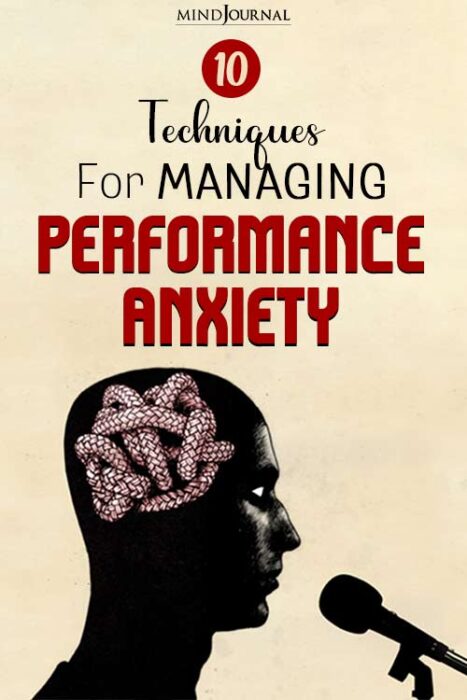
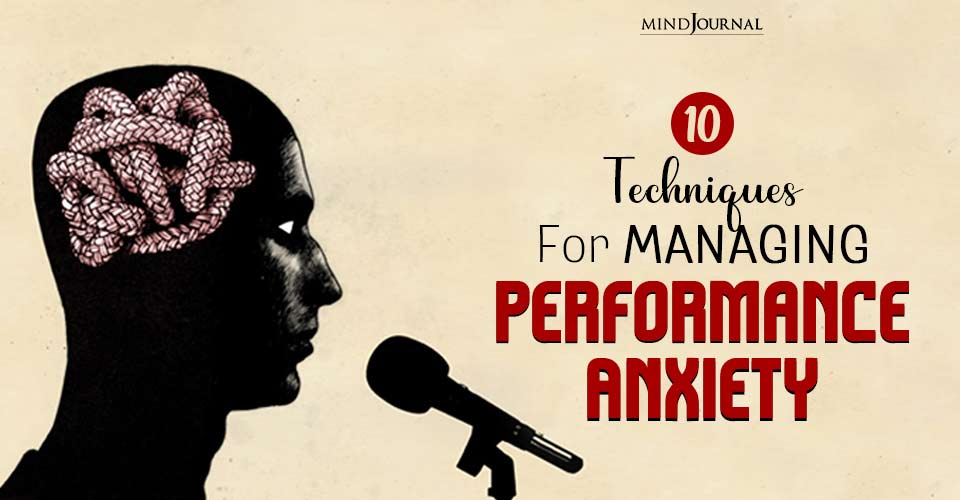







Leave a Reply
You must be logged in to post a comment.